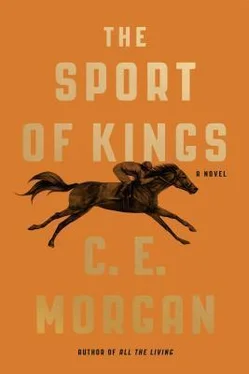It was as though she hadn’t heard; she just stood there like a deaf-mute, seeming utterly innocent, then her hands twitched, and she said abruptly as if jerking awake, “Twenty-nine.” Lou thought, My God, she had to think about that; she had to count.
“I guess I haven’t seen you in a while,” she said gently. “When are you due?”
This answer came quickly. “Five weeks.”
“Boy or a girl? You’re carrying pretty low.” Lou resisted the urge to reach out and touch her. Though she sensed some of the girl’s ice was melted, that was not the same thing as warmth.
“I don’t know,” said Henrietta with an eerie, imperturbable calm — not exactly despondent, but low. Hard fact had come to roost in the girl’s mouth, and it crowded out small talk.
Lou said, “Would you care to sit outside? There’s a bench under a tree at the end of the barn. It’s a nice place to take a minute.” Henrietta just nodded and followed, and they settled themselves there, the September sun as warm and comforting as bag balm on their faces and necks and their hair, one redheaded, the other early gray — or, not so early; Lou was now forty-five. Neither young nor old, but right in the middle of things.
They sat in silence a while before Henrietta said abruptly: “How do you figure out how to be a mother?” She could have asked her own mother, but why would she?
Lou didn’t have to think on it. “Some of it comes naturally. The hormones help, a lot of it will feel instinctive. But not entirely. I can tell you the worst day of my life was the day after my daughter was born, when I was exhausted and she wouldn’t breast-feed. I thought I was going to have a nervous breakdown.” Lou leaned back into the bench, remembering. “You know, babies are pretty shocking. No one ever tells you how hard it is to have small children, how utterly consuming. I remember feeling kind of angry about that — that other women hadn’t told me how tough it would be. They only shared the good stuff. Plus, babies are really disruptive to a relationship, even a good one.” She glanced at Henrietta sideways, carefully.
Henrietta nodded curtly, her face inexpressive. Then: “Will I be a good mother?”
Instantly, unbidden, Lou was charged with a sense deeper than knowing that this woman — this girl, rather — had never been properly loved, that she didn’t know the first thing about real intimacy. It cracked Lou’s heart. But the awareness was fleeting, and she said, with the equanimity of a counselor, “You’ll do just fine. I can tell you the titles of a few good books. My only real advice is don’t leave the hospital until that baby’s latched on good and tight.”
When Henrietta said nothing further, an easy silence washed in like a gentle stream that carried their conversation away. Lou fought the urge for further niceties: How is your father? How is that magnificent filly, that two-year-old everyone is talking about? She’s showing awfully well against the boys, placing four out of four and inspiring talk of greatness. But Lou waited. She waited, because she was quite confident this girl had never delivered a social call in her life.
Then Henrietta cleared her throat and said, “You told me something once. Something I didn’t understand. I remembered it the other day.”
Ah, here it was. Lou turned her palms up to the warm September sun and waited.
“It was the day Hellsmouth was foaled. You said something about every horse being the product of evolutionary failure. Something to that effect.”
Lou stretched back her head a moment, looked up at the sky. “Yeah, sure,” she said, “I guess it’s kind of ironic.”
“What do you know that I don’t?”
It struck Lou as a funny phrasing, and she smiled. Then she turned toward Henrietta, who turned toward her, so their heads almost touched, and they spoke in quiet tones, the red, desiccated leaves of the tree falling all around them, a few onto their laps.
When Henrietta straightened up, her face was pinched with consternation.
“Then why are we chasing the perfect horse…?”
“Who knows,” said Lou, ticked her head to one side. “There’s no such thing. Beauty, maybe. We always seem to get sidetracked by that. And horses are such beautiful remnants.” She glanced sideways at Henrietta. “I thought you would have learned all this in school. Horses used to be the model for evolution, at least when I was a kid.”
Henrietta flushed. She suddenly looked angry, but not at Lou. She stared out over the black, peeling fences, the green bluegrass under the sun with its tireless recapitulations, over the many fillies in the field before them. She was struck by a sudden lash of jealousy. These imperfect little fillies would be protected, coddled, and prized in aeternum if they proved themselves in the sport of kings — what strange luck to be a thoughtless horse. What woman could hope for half as much in this world? Suddenly, she began to laugh. It was not the sound of amusement. It emerged as a confused cry, a conflicted cry. Then it boiled up and spilled out from the center of her with absurd force. She leaned forward, and the sound crashed like cymbals in her mouth. My God, she was laughing so hard she was gripping herself as if in pain, her shoulders heaving with grieved humor, tears spilling from her eyes, but then she was suddenly quiet with her head bent, so it seemed at first she was merely spent, having released some demon from her imagination. Lou realized she was hunched over herself, looking down at her protruding belly.
“Henrietta, are you all right?” said Lou.
She couldn’t speak. The seizing was strong and swift. It gripped her with such ferocity that she seemed mildly surprised to see her belly wasn’t actually moving, though she’d sensed for days that something indeed was gathering its energies within her. It was coming as sure as the change of seasons, shifting from elegiac autumn to hard winter.
Lou was watching her carefully. She counted in the habit of her training. “Well, that’s a long contraction,” she said in an even voice. “Are you sure this is your first one?”
It was a moment before Henrietta could raise her head. A fine film of sweat had formed on her upper lip, and her cheeks were flushed with a ruby color. She shook her head. “I don’t know. It’s been … shifting.”
“Have you felt crampy…?”
Henrietta nodded weakly.
“For how long?”
“Three days.”
Lou didn’t ask, she just tightened her arms around the girl’s shoulders and said, “Okay, sweetheart, up you go. Let’s get you to the hospital just to be sure. Just to be safe.”
Henrietta said, “University of Kentucky.”
“Okay, no problem. I’m going to take you right there.”
“I’m not afraid,” said Henrietta.
Lou smiled. “I’ve been afraid every day of my life,” she said. What she did not say: When my own labor started, I thought I was going into battle, but, honestly, it wasn’t anywhere near as bad as I thought it would be. I’ve had ruptured cysts that were worse. But even as she thought the words, making their way to her truck, Henrietta’s arm was slipped through hers like a fish through a holey net, landing on the ground, where she moaned steadily, steadily as a song, a dirge, an incantation. She sat there on her crossed legs, her hands grasping at her belly, simple suffering on her face. Lou could do nothing but kneel beside her as an attendant, patting her back.
When Henrietta’s face finally loosened, Lou helped her to her feet. A few tentative steps and she was walking easy again, helping herself into the cab of Lou’s truck and waiting there for Lou to slip in behind the wheel. Only then did she say, “Will you call my father?” which Lou did, saying they were headed to UK and detecting panic there in the man’s voice, so different from the low, even, steady, unmoved, resilient, enduring voice beside her. It made the hair stand up on her arms.
Читать дальше
Конец ознакомительного отрывка
Купить книгу












